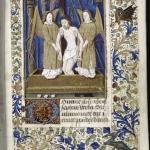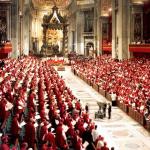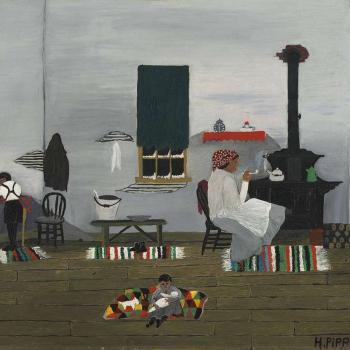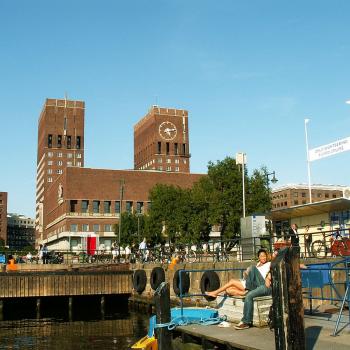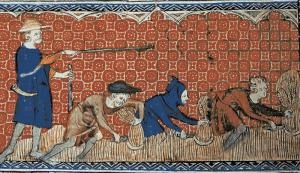
Christianity is a communal religion; it coheres in a Church, a body of believers spiritually- and socially-united in faith and deed. Whatever people may say about Vatican II seriously wounding Catholicism, no Christian group has escaped challenge from an individualistic modernity. In fact, some say our decline goes back well beyond the Council. First and foremost, any decline in Christianity has stemmed from the destruction of our communities. People must move to find work, alienating themselves from structures of support. Poverty with little hope of help might follow. Even if it does not, extreme isolation and loneliness often do. Those who remain behind face a plague of addiction, with only broken communities left to offer any assistance. How can any ecclesial religion hope to weather such times?
Our problem is compounded—in the American context—by a failure of orthodoxy and orthopraxis to coincide. Many will disagree; I am sure. But I simply do not believe that whatever pluses American conservatism may offer to the Catholic voter, that the rest of its agenda may be excused. At first, if pushed on this point, many will bring up the issue of abortion. They might say that this issue outweighs all others on account of its moral gravity (which, to my mind, implies a certain kind of utilitarianism in which ethical problems can be assigned weights and compared willy-nilly). This position has its problems, but I can understand that, for someone who truly believes in the logic I have just outlined, this might seem a reasonable option. Rarely, however, does the reasoning stop here.
Many American Catholics believe that the principles enshrined in US conservatism best approximate those found in the social teaching of the Church; they do not merely believe themselves to be choosing a lesser evil, they see conservatism as the vision of the Fathers approximated in our modern context. This concerns me. As a result, I would like to consider three common arguments used to buttress this position; from there, I will examine the inverse problem facing the liberal wing of the Church. Taken together, the failures of both positions may help us understand what is to be done as regards to the size and state of our religion. In my eyes, we face rampant heterodoxy and heteropraxy. Learning from these modern mistakes provides us with an opportunity to build a brighter—and more faithful—future.
The first argument worth considering is that bishops have no business being involved in politics (one often sees this point used when the pope or some other hierarch speaks out about the environment). The second is that the Church fundamentally defends the sacred right to own private property. The third, and last, that I will examine is the idea that certain Church teachings are vague, and thus allow for substantial disagreement in a way others do not.
Bishops have always been political. I mean this in two senses: for one, they have always been involved in politics; secondly, they have always leveraged that power to various ends. We find this in nascent form in the Acts of the Apostles:
They devoted themselves to the teaching of the apostles and to the communal life, to the breaking of the bread and to the prayers. Awe came upon everyone, and many wonders and signs were done through the apostles. All who believed were together and had all things in common; they would sell their property and possessions and divide them among all according to each one’s need. (Act 2:42-45)
Never mind their precise mode of organization (that’s for another discussion), note that the Apostles organize the emerging community in a distinct way; they become their own polis within the larger structure of Israel (and of Rome!). The heads of the Church teach in a specific way; the people follow. In short, they organize themselves through the teaching of their bishops.
In this, the Apostles are merely channeling the deep social consciousness of the Old Testament. There are the oft-forgotten jubilees, entailing debt forgiveness, among other things. Better known are the prophets themselves. One could basically quote at random (that’s how ubiquitous such passages are), but one passage from Ezekiel summarizes things nicely, even if it lacks some of the pathos found in the other prophetic books:
If a man is just—if he does what is right, if he does not eat on the mountains, or raise his eyes to the idols of the house of Israel; if he does not defile a neighbor’s wife, or have relations with a woman during her period; if he oppresses no one, gives back the pledge received for a debt, commits no robbery; gives food to the hungry and clothes the naked; if he does not lend at interest or exact usury; if he refrains from evildoing and makes a fair judgment between two opponents; if he walks by my statutes and is careful to observe my ordinances, that man is just—he shall surely live—oracle of the Lord GOD. (Ezekiel 8:5-9)


